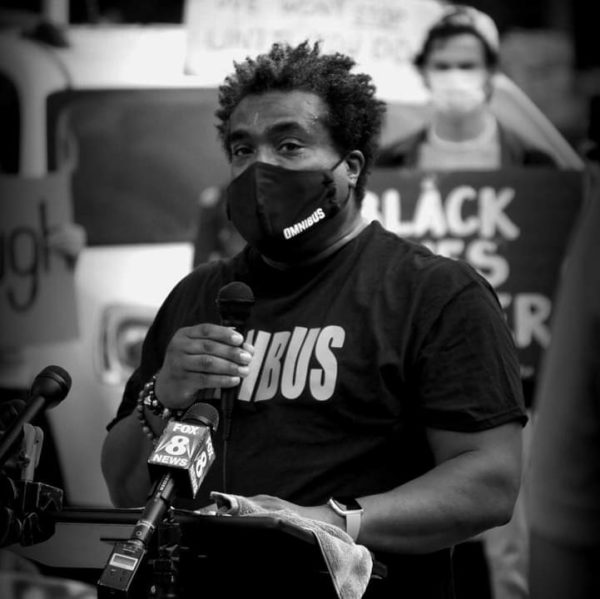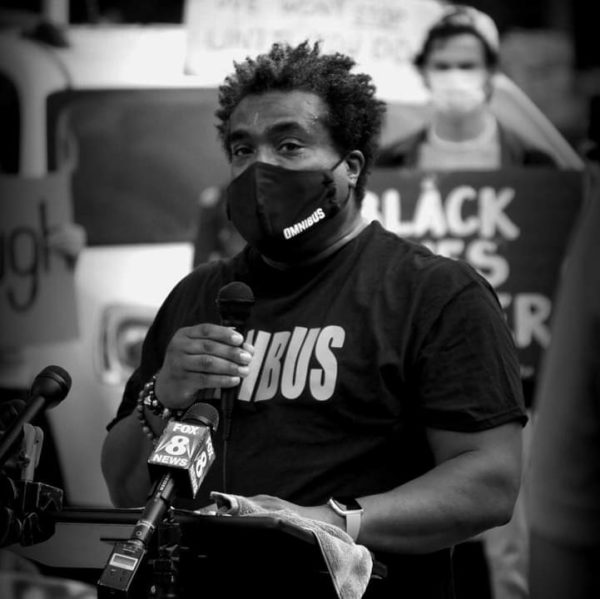‘Racism Is a Pervasive Problem In the Fire Department’: Group of Black Firefighters In North Carolina Allege Long Culture of Racism
It was an ordinary day of training at the Winston-Salem Fire Department in November 2019. Firefighters were beefing up on ropes and knot-tying skills when a symbol of hate interrupted the class.
Michael Chapman, a white fireman, tied a noose and held it up to Darius Johnson, one of his Black counterparts in the department, then asked if Johnson knew what type of knot it was.
Nooses were tied around the necks of thousands of Black men and women who were lynched during the Jim Crow era.
When Johnson reported the racially charged gesture to his higher-ups, it spiraled all the way up the command chain to Fire Chief William Mayo.
Yet when Mayo was made aware, he took no action against Chapman, choosing instead to “move to the next topic of discussion.”
That’s all according to a grievance filed by a group of Black firefighters in Winston-Salem, North Carolina, that alleges top-ranking members of the city’s fire department have allowed a culture of systemic racism to fester throughout the ranks.
The grievance was filed in October by Omnibus, a contingent of current and retired Black firefighters in Winston-Salem who say they have been subjected to years of racist and inappropriate comments in person and via social media.
Omnibus provided Atlanta Black Star with a copy of the 18-page report, which laid out several instances of alleged abuse that the group says has fostered a hostile climate for Black officers.
“Nothing has been done to the individuals; the city has thwarted this because they thought we would go away,” said Thomas Penn Jr., a 28-year veteran of the fire department who is one of Omnibus’ leading members. “Not only will we not go away, we will become stronger.”

Omnibus is calling for the termination of Mayo along with four of the department’s white fire captains — Kelly Black Jernigan, Kevin Shore, Christopher Belcher and Edward Blair. Penn indicated “they need to be a shining example to other individuals who might think it’s okay to do that.”
He said Omnibus filed its grievance to shed light on a widespread problem that lurks just beneath the surface at firehouses across the country.
“Racism is a pervasive problem in the fire department,” Penn told Atlanta Black Star, “because most white men and women who are part of the fire service — particularly the men — feel this is their God-given right to be here. This is something that they do, it’s something that they treasure, and they don’t feel like they should have to share it with anyone. It shows, and it’s not unlike the police department.”
The Complaint
Omnibus’ grievance with the city of Winston-Salem alleges Mayo aided and abetted the climate of racial discrimination in the department. It alleges he had a “disregard for a federal hate crime” by turning a blind eye to the noose incident. The complaint went on to claim the chief was negligent in helping firefighters under his command who “endured threatening and vile language” from fire captains in the department.
One of the allegations was that a private citizen told Mayo how a Black firefighter was suffering abuse and threats from Capt. Shore and the chief didn’t intervene.
“Chief Mayo has failed those under his command by allowing them to endure both direct and indirect threats,” it stated. “When made aware of said infractions Chief Mayo failed to act or did so in a manner that was less than commensurate with the violation.”
The report listed several Facebook postings from fire department brass over the summer that were “(eerily) reminiscent of a not so distant past.” Many of them were anti-protester sentiments that cast aspersions of national demonstrations following George Floyd.
Shore didn’t denounce Jacob Pardue when the young firefighter made “racist and threatening” comments, the grievance alleged.
“With this logic I guess anyone with the name Dixie is racist?,” Shore wrote. “Trying to rewrite history will not change it. And those wanting change should do some research on the topic — what they will find will change how they view it. Learn from history and be better because of it, not remove or try to erase it. First riots, removal of statues, changing the names of events, there is no end to this.”
Pardue responded, “Exactly. They’re ignorant of their history.”
Marcia Dudley, a Lowe’s staff worker, chimed in later in the thread.
“Why don’t we take out all the Black people and move them all back to Africa or wherever they all came from and then all about slavery will be erased…Right?” she wrote. “All who are offended by slavery, we’ll packem up movem out! Case closed.
“They should be thankful that SLAVES were brought over or they would all still be in Africa! I’m so sick of this crap,” Dudley added.
The grievance also featured several of Dudley’s Islamophobic comments and memes. Omnibus officials said she was fired from her job after the social media postings became public.
Capt. Black Jernigan reposted a July 11 video that showed riot police using German shepherd canines to push back protesters. She captioned her endorsement, “That’s what I’m talking about! Turn them loose.”
Capt. Blair alluded to arming himself when he commented on a video of protesters blocking Interstate 40 in Greensboro, North Carolina.
“Oops…I’m talking like a ‘2nd Amendment’ dude,” he wrote.
In another picture of three handguns, Blair wrote “Heading down to Charlotte for supper this evening…I’m bringing my own silverware.”
Blair told the Winston-Salem Journal he was responding to a specific comment and describing a Saint gun in the comment featured in Omnibus’ report.
“I completely deny all these allegations,” he claimed when the newspaper asked him about the Facebook screen shots. “Didn’t happen. Every bit of this has been taken out of context. There was never a threat made.”
A Long History of Intimidation
Many instances of racial bias were not listed in the grievance. That included reports of Black firemen being left on trucks, white firefighters tampering with their partners’ equipment, and asking Black firefighters “how’s it okay for you guys to call each other n—-r, but we can’t call you n—-r?” according to Omnibus members.
Garry Wadell was part of the second generation of Black firefighters that integrated the Winston-Salem Fire Department. He was hired in 1989 by Lester Ervin, the city’s first Black fire chief.
Wadell described a culture clash between his crop of recruits and an old vanguard that didn’t want them in their firehouses.
“What would traditionally be considered white space,” Wadell said. “Now you’re introducing this element of young, African American men who were college educated. And a lot of those captains and engineers were not.”
The ranking officers often wouldn’t train Black firefighters properly, if at all. He said they set young Black crew members up for failure and tried to get them to quit. His captain attempted to fire him for petty offenses.
It was all part of a climate of hazing, and Wadell said it was intensified for him because he had a white wife.
He claimed his fire captain pulled him aside one day early in his career and told him “Your wife can’t come by this fire station while you’re on duty.”
Wadell retired from the department as a fire engineer in 1999. But he claims those longstanding attitudes have not changed to this day.
“Everybody likes firefighters. Who doesn’t like firemen?” he said. “They’re not cops. People, for the most part, are glad to see you coming. Under the circumstances, people want to see firemen in their communities.
“But they don’t know what’s going on internally. And all of this starts from the top. The chief always sets the tone, how everyone is going to behave and carry themselves as men and women of this organization.”
Craig Williams rose to the rank of battalion chief during his 30-year career with the Winston-Salem Fire Department. When he was hired in 1987, the goal was to diversify the ranks and make it more representative of the community. Winston-Salem has a Black population of 35 percent, according to U.S. Census estimates. Yet Black employees make up just over 21 percent of the department’s workforce, according to the Winston-Salem Journal.
And the demographics are getting worse.
Penn said when he started his career in 1993, nearly 40 percent of Winston-Salem’s firefighters were Black. He noted he’s been on the brink of being fired for “racially motivated” reasons since his first week on the job.
Meanwhile, when Williams retired in 2016, he said there were five Black battalion chiefs in the department.
Now there’s just one.
“We’re concerned about the system because the system’s not concerned about us,” Williams said.
The retired chief described a ruthless culture of department politics meant to ruin the careers of Black firemen.
Williams claimed some tried to sabotage Blacks’ efforts on a practical skills test used for promotions. Other co-workers in the running to climb the ladder went as far as forming “clusters,” he said, and filed baseless grievances against Black firefighters in competition with them for promotions. Those grievances often made the Black firemen ineligible for promotions for 365 days while they were pending.
“Not only do they not want you there, they don’t want you to have any rank,” Williams said. “Once you start to get promotions, their rivalry against you starts to get even more intense.”
Those who managed to advance in the department were tasked to order younger Black laddermen “to stay in line, he indicated.
“I think it goes higher than the chief,” said Williams. “I think it goes all the way up to the city manager to determine the climate in the department.”
City Investigation
Omnibus was formed in June and has publicly campaigned for sweeping reforms in the fire department since July, news reports indicate.
Members say other minority firefighters were affected by the discriminatory acts, but they were targeted more toward Black officers.
“This is highly unusual that an employee would send a grievance to the media,” Winston-Salem’s assistant city manager Damon Dequenne told the Journal. “From the city’s perspective, this is a personnel matter, so we will not discuss it.”
Penn said his team has met with city attorneys. They haven’t ruled out taking civil action in court.
City officials are currently reviewing Omnibus’ grievance and interviewing group members about what they’ve witnessed and experienced. That’s not necessarily a good thing. Members called for an independent investigation.
They did get an outside review. Winston-Salem’s city council voted in September to hire a consultant to analyze Omnibus’ claims and conduct a racial climate study of the department. About a month later, the city implemented a “soft skills training course” aimed at helping department members accept their differences and work better together.
“The only reason we filed the grievance is because we wanted the public to see how corrupt the city is,” Penn said. “It has nothing to do with seeking justice because we know the city of Winston-Salem is not interested in that. If they were interested in that, then they would have rectified the situation long before we made our claim.”

